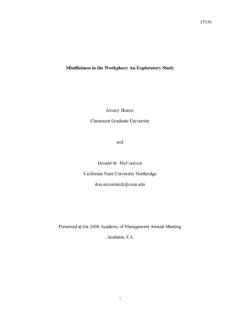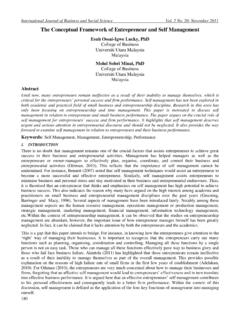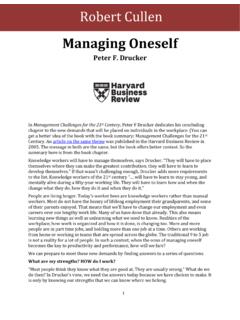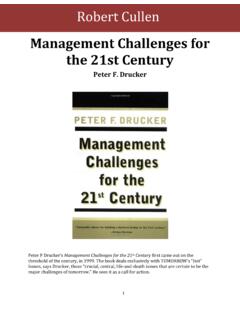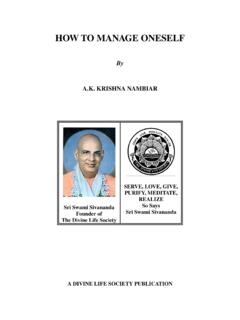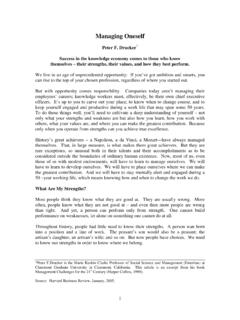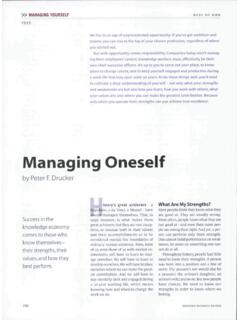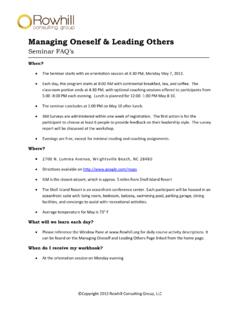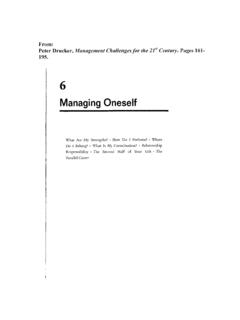Transcription of Knowledge Worker Productivity and The Practice of Self ...
1 Chapter 11 Knowledge Worker Productivity and The Practice of Self-Management By Jeremy Hunter, , with J. Scott Scherer More and more people in the workforce and mostly Knowledge workers will have to manage themselves. Peter F. Drucker, Management Challenges for the 21st Century Toward the end of his life, Peter Drucker asserted that making Knowledge workers productive was the biggest of the 21st century management challenges. 1 Other scholars support Drucker s position. Tom Davenport, a leading thinker on Knowledge workers, underscores why this Productivity is so important: If our companies are going to be more profitable, if our strategies are going to be successful, if our society is going to become more advanced it will be because Knowledge workers did their work in a more productive and effective manner.
2 2 The task of improving Knowledge Worker Productivity is immense, and so are the consequences of failing to do so. In fact, Drucker warned that improving Knowledge Worker Productivity is the first survival requirement of developed Failure carries dire consequences for a nation s economy and society. Significant efforts have been made in this quest, with varying degrees of success. Most endeavors have focused on the logical suspects work process, managerial Practice , organizational structure, information technology and workplace Despite these efforts, quantum gains in Productivity have not flooded the workplace.
3 In his blog, Davenport wondered why more headway wasn t being made, even going so far as to ask, Was Drucker wrong? 5 Alas, Drucker s 21st century challenge is proving to be a tricky lock to pick. Perhaps the key lies hidden elsewhere. Thus far, most energy has focused on the Worker 's external environment. If, according to Drucker, the primary asset of a Knowledge economy lies between the ears of its Knowledge workers,6 then maybe the key to enhancing Productivity lies within the workers themselves. Productivity from the Inside Out An internally based exploration of Productivity asks different questions about how to optimize it.
4 An inner approach examines how a Knowledge Worker manages or mismanages her internal experience, and helps her to see how her internal processes have a direct impact on her outward behavior. Some questions to ask are: How do Knowledge workers use their attention to focus on and engage with work and one another? How can rigid, judgmental mindsets be shifted toward the openness, learning, and transformation that are the heart of innovation and problem solving? How do negative emotional reactions derail the work process or corrode the morale of a work group?
5 Losses in Productivity can often be traced to momentary events inside a person events whose outward expression disrupts clear thought and effective social interaction. In short, visible behavior results from invisible processes that occur within a person s inner black box, often with negative consequences: A senior executive s emotional volatility makes him a scary person to report to. As a result, bad news does not get delivered, and the right decisions are not made. The organization begins to reel off course. Defusing the inner churn that precedes his eruptions quells his outbursts and, in turn, changes how his people relate to him.
6 A team leader s penchant for judgmental and sarcastic comments erodes team morale and performance. Talent leaves the organization, along with the Knowledge capital the company needs if it is to thrive. Teach the leader not to utter his acerbic thoughts and to be more supportive, and watch team performance improve. An up-and-coming manager s multitasking BlackBerry addiction compulsively distracts her attention in meetings. She misses key points, her colleagues feel disrespected, and decision-making takes longer. Her chances for promotion are diminished.
7 If the manager keeps her attention focused, decisions proceed more smoothly and her team feels more respected. In each example, maladaptive behavior can be traced to an event inside the Worker that affects outward performance. But why should management be concerned? The answer becomes clear upon reflection. Drucker reminded us that Knowledge workers must be considered a capital asset. 7 If an organization is seeking to grow its assets and to maximize their return, and if Knowledge workers Productivity is deeply influenced by the workers inner states, then helping Knowledge workers to cultivate optimal internal states becomes the responsibility of management and, in effect, becomes an exercise in asset management.
8 If we know internal states affect behavior, then the Productivity challenge shifts to how to manage these states effectively and how to improve them. In The Practice of Management, Drucker illuminated the dark continent of management 8 and made conscious the inner workings of the organization. Analogously, the Practice of self-management, as I have coined the phrase, allows the Worker to shine a light into his own inner black box to illuminate his internal processing, and then to transform these processes to enhance his effectiveness. The Practice of self-management builds directly on recent advances in neuroscience, medicine and psychology.
9 The model melds Drucker s classic themes of change and continual transformation with contemporary views on human development, providing a systematic framework of theory and Practice to help Knowledge workers better manage themselves, their work and their relationships. In the process, workers transform their individual and collective Productivity and, in turn, generate more capital for the organization. Creating the Practice of Self-Management I developed the Practice of self-management after conducting a research study that involved interviewing prominent, successful professionals dedicated to practicing mindfulness.
10 Mindfulness practices are a method of attention development that enhances self-awareness, self-regulation and self-transformation. I ll say more about what that means later. In recent years, mindfulness practices have received considerable scholarly attention. Research studies have demonstrated these practices improve numerous measures of well-being, including mental and physical health, self-regulation and the quality of Outside of the academy, mindfulness practices produce tangible results in a variety of professional settings. Such methods inform stress management programs used in hospitals in more than 26 countries around the Mindfulness has been incorporated into legal training,11 and it has been applied successfully in professional sports, notably by coach Phil Jackson in his NBA championships with the Chicago Bulls and Los Angeles The professionals I interviewed in the research study included a Fortune 500 CEO, a well-known architect, a financier, senior corporate managers, medical researchers, a film director and a host of other prominent Knowledge workers.
